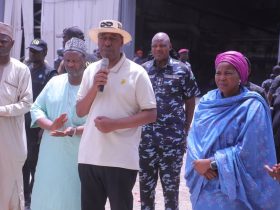The Institute for Peace and Conflict Resolution (IPCR) has expressed deep sorrow over the tragic loss of lives and widespread devastation caused by recent floods in Niger State, Nigeria.
In an official statement, the Director General of the IPCR, Dr. Joseph Ochogwu, conveyed the institute’s condolences to affected families and communities, following reports that more than 150 people have died and thousands displaced by the disaster.
The flooding, reportedly triggered by the release of water from the Kainji Dam, has wreaked havoc across several communities—destroying homes, farmlands, and essential infrastructure. Dr. Ochogwu described the situation as a humanitarian crisis that demands immediate and coordinated response efforts.
“The people of Niger State are facing untold hardship. Many have lost not just their homes but their livelihoods and access to basic necessities,” he said, emphasizing the urgency of delivering relief.
The IPCR, which plays a key role in promoting peacebuilding, dialogue, and human security across Nigeria, called for swift intervention from government agencies, international partners, and civil society organizations. The institute stressed the need for comprehensive support, including food aid, temporary shelter, medical assistance, and psychosocial services for displaced residents.
“We mourn with the families and communities affected by this disaster. Now is the time for solidarity, not silence. Our collective action can bring relief, restore hope, and help rebuild lives,” Dr. Ochogwu urged.
Beyond the immediate emergency response, the IPCR also spotlighted the importance of disaster risk reduction, early warning systems, and long-term resilience strategies to mitigate the impact of future environmental emergencies.
The institute reaffirmed its commitment to working collaboratively with stakeholders to uphold peace, safeguard human dignity, and strengthen the country’s capacity to respond to natural disasters.
The Niger State flood is one of the deadliest in recent years, raising urgent questions about climate resilience, dam management protocols, and the protection of vulnerable populations in flood-prone areas.












Leave a Reply